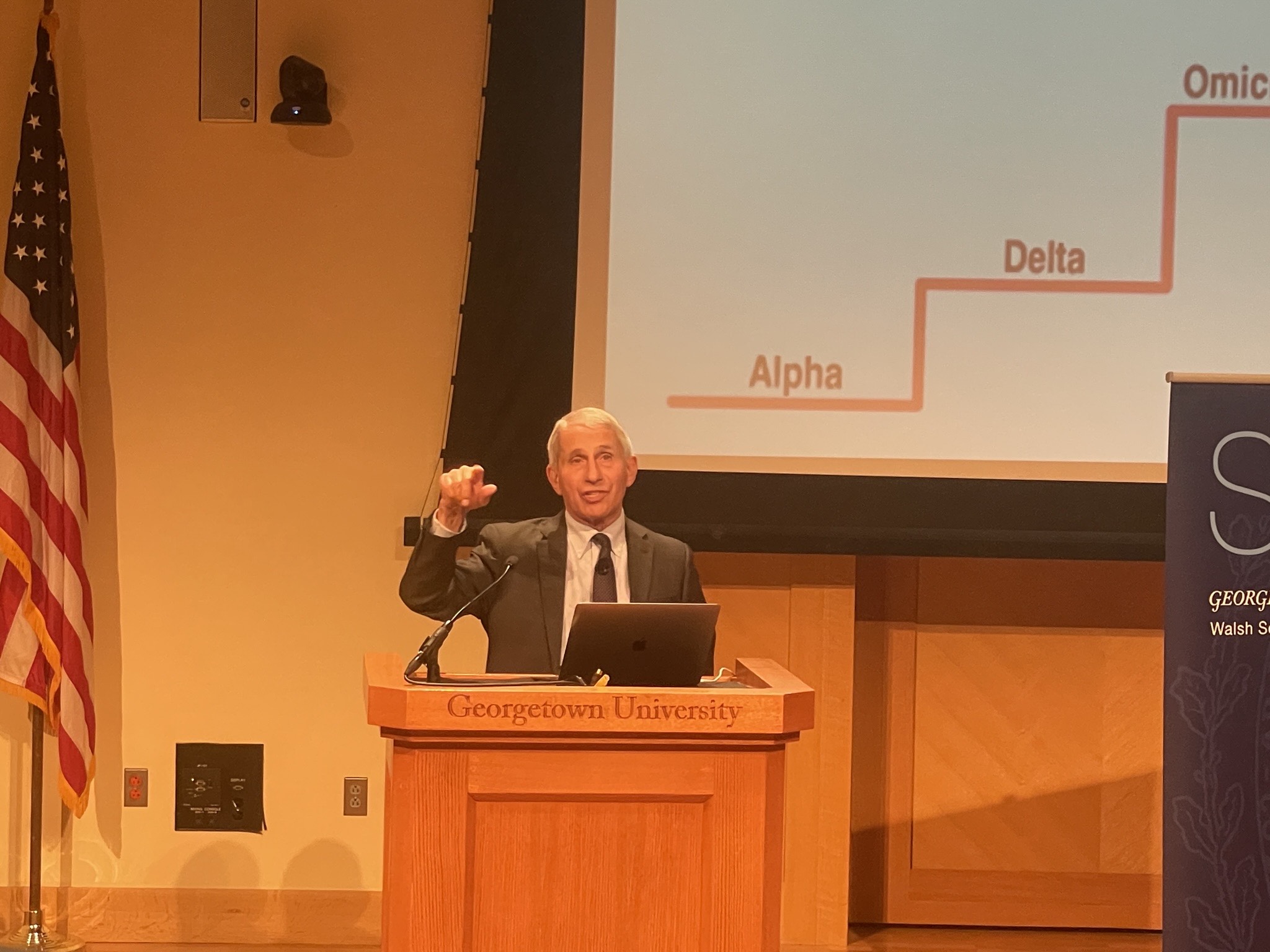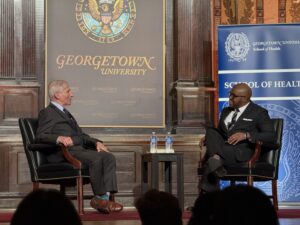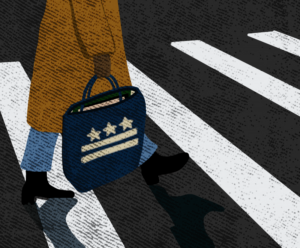During Georgetown’s annual Maloy Distinguished Lecture on March 27, Dr. Anthony Fauci outlined 10 lessons he thinks should be learned from the COVID-19 pandemic, including the threat of misinformation and the importance of acting rapidly during health crises. During the event—hosted by the Science, Technology, and International Affairs Program—he spoke candidly about the pandemic and U.S. response.
SFS Dean Joel Hellman introduced Fauci, the former chief medical advisor to President Joe Biden and a leader of the United States’ COVID-19 response. Hellman outlined Fauci’s decades of public service, working in infectious disease response under seven presidents.
“[The] SFS is a school built to train new generations, to understand global problems and to combine the best of theory and practice to craft durable solutions,” Hellman said. “Who better represents that guiding mission than Dr. Anthony Fauci? For over 40 years, he has been at the intersection of research and problem solving to confront some of the most challenging global crises of our time.”
Beginning his lecture in front of a packed auditorium, Fauci emphasized the importance of learning from this pandemic, predicting that another one is likely to occur during the lifetimes of many in the room.
Fauci’s first takeaway from COVID-19 was to “expect the unexpected.”
Public health officials were not ready for several aspects of SARS-CoV-2, Fauci said. Officials had not anticipated the virus’ multiple variants, its high levels of transmissibility, or the prevalence of asymptomatic and presymptomatic transmissions. They attempted to predict what would happen next at the beginning of the outbreak, but learned—with variants like Delta and Omicron—that predictions were largely ineffective.
“We were completely unprepared historically to have continual waves of viruses of the same broad species that continued to evade immunity. What do you do about that?” Fauci said.
He then highlighted the necessity of acting “early and rapidly” with public health interventions, as well as sharing information openly across the globe.
A couple warnings came from these lessons, with Fauci reminding those gathered that pandemics spread exponentially, while information is delayed. During infectious disease outbreaks, positive cases, hospitalizations, and transmission rates reflect conditions from two or three weeks earlier. So, he said, global collaborations are necessary to overcome these informational delays.
Fauci’s next four lessons urged the importance of using past research to inform the present, and researching in the present to inform the future.
Research and testing for the COVID-19 vaccine came from previous innovation, which allowed for an unprecedentedly fast vaccine creation. Within five days of the virus’ genetic sequence release, vaccine research had begun and within 11 months it was approved, saving millions of lives, Fauci said.
However, the historically fast turnaround was only possible because the actual vaccine design came from decades of research on mRNA, as well as HIV and MERS prevention. The vaccine’s clinical trial infrastructure was repurposed from HIV trials—a project which Fauci, who helped lead the 1980s HIV/AIDS epidemic response, knew well.
“If we didn’t have the infrastructure that we built 40 years ago, we would never have been able to do this as rapidly and efficiently as we did,” Fauci said.
Now, researchers should focus on identifying families of pathogens which could be a threat in the future—including Coronaviridae—and begin preparing responses, he emphasized.
Researchers should also direct more attention toward the human and animal interface, he said. Despite government disagreement around the start of the outbreak, Fauci said it likely began in a market in Wuhan, China and was the result of “the encroachment of the human species on the animal kingdom.”
Fauci added that public health response has to take into consideration systemic health and social inequities, which drive disparity. Issues including discrimination, housing, occupation, education, income, and lack of healthcare cause infectious disease outbreaks to have outsized impacts on some demographic groups. Data from the Centers for Disease Control and Prevention shows that Black, Indigenous, and Hispanic communities had higher rates of hospitalization and death than white populations during the COVID-19 pandemic.
Fauci’s ninth lesson cautioned against the prevalence of misinformation and distrust of science. He emphasized that public health efforts are made significantly harder when false information is widely spread and believed, such as what happened during the COVID-19 pandemic.
“The thing that worries me right now, about society, is that we have come to accept the normalization of untruths. You can say something that is completely, egregiously wrong and you get proven in a fact-check that you are wrong, and the answer is, it doesn’t matter, I still believe this,” he said. “If this is the way we function, society is in a bad place.”
Finally, the infectious disease expert turned his eyes to the immediate future of COVID-19, with a quip, “it ain’t over, ‘til it’s over.” Eradicating or eliminating COVID-19 won’t happen, Fauci said frankly. But controlling the disease and a return to “normalcy” with endemicity—when a disease has a constant, baseline presence in a geographic area—is possible, and likely.
“I think we’re on our way there and will likely get there in the not so distant future,” Fauci said about reaching endemicity.
Although COVID-19 will likely remain into the indefinite future, the prevention of other pandemics is possible, he said optimistically.
“If we do and pay attention to some of the things I’ve spoken about, you can prevent an emerging infection from becoming a pandemic. It’s very unlikely that you will prevent totally the emergence of a new infection, but you can prevent or blunt that emergence from becoming a pandemic,” Fauci said.
After the lecture, Fauci remained for a 15-minute discussion, answering questions about his HIV/AIDS work, the U.S. COVID-19 response, and his decades in the government. In his parting words, the longtime public servant spoke to the importance of doing work that serves others.
Until his retirement last year, Fauci spent nearly four decades as the director of the National Institute of Allergy and Infectious Diseases and told the audience that he found public service to be “enormously gratifying.”
“Public service is not for everyone, it isn’t, but somehow, fashioning in your life service to others can be part of everybody’s goal,” Fauci said. “I would encourage everybody in the room to actually think of some way that what you do, whatever you go into, you do something where you give back or serve the public.”






Sad